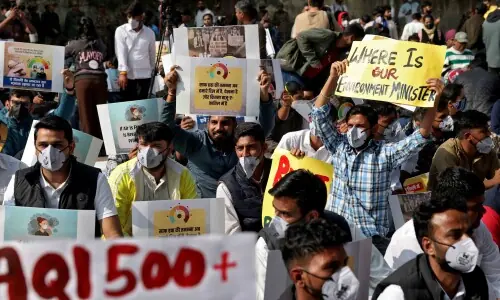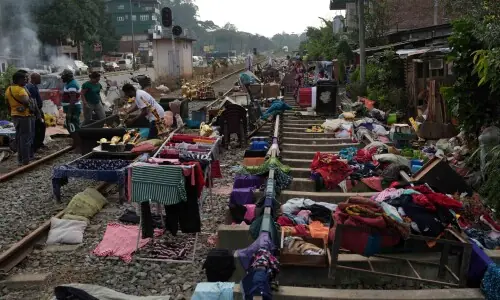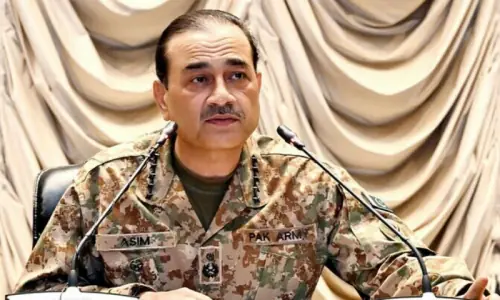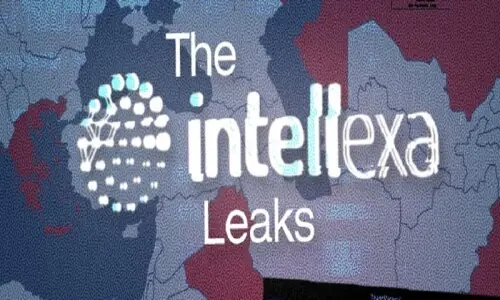KANDAHAR: After the worst drought in living memory, it is not just water that has evaporated from the dusty, light brown soil of southern Afghanistan.
Gone too is the optimism that greeted the fall of the Taliban last year.
Already southern Afghanistan feels desperately neglected by the outside world, as well as by the government in Kabul.
Insecurity is rising, the drugs trade is back on its feet, there is barely a trickle of foreign aid and disillusionment is turning into anger.
Few Afghans have forgotten how the Americans helped them overthrow their Soviet oppressors only to walk way and let the country dissolve once again into chaos.
In Kandahar, the former Taliban bastion in the south, people are already wondering if history is about to repeat itself.
“Afghans had high expectations from Europe and from the Americans, expectations that they would try to rebuild Afghanistan and work for stability,” said a driver with a UN agency in Kandahar.
“That does not seem to be the case. Afghanistan has been let down.”
The needs of southern Afghanistan are huge. Education and health systems have been decimated by two decades of war and misrule and the drought is causing yet further widespread misery.
PROMISES UNKEPT: Despite promises by international donors made in Tokyo in January, there is little sign of the $4.5 billion the country was promised.
In the offices of the United Nations World Food Programme, Sikander Khan says he has just 400 tons of wheat in his warehouse, and cannot say when the next delivery is coming.
There are 400,000 internally displaced people living at the edge of survival throughout southern Afghanistan, and many more in desperate need of help. Khan is struggling to keep up.
Diderik van Halsema of Medecins sans Frontieres said Afghanistan is seeing donor fatigue even before promised money has arrived:
“It’s easy to make nice noises around the donor table but it’s a different story to live up to it. In practice the follow-up has been very meagre.
“The whole world attention is turning to Iraq, and Afghanistan is being forgotten,” he said. “This is the only chance for the past 23 years for the country to have a bit of a brighter future, and the international community should take it.”
POWER VACUUM: In provinces like Helmand, Uruzgan and Zabul, few government officials have been paid since the fall of the Taliban and complain that Kabul is not sending the cash. The lack of money is one cause of a growing power vacuum.
“In Helmand, it is really chaotic,” said Abdul Ghani, a taxi driver in Kandahar who regularly makes the trip to the neighbouring province. “Armed men rob vehicles, and many of them are officials from the province.”
Most people were happy to see the back of the Taliban, although a few remain nostalgic in their former stronghold of Kandahar. Everyone agrees security was much better then.
“Of course, they were tough, even I was beaten,” said Haji Said Noor. “But at least there were no thieves. The security they provided was admirable.”
Despite the insecurity, some people make money legally. Truckers on roads to Pakistan and Iran say business is booming in televisions, video and music cassettes, even perfume, all banned under the Taliban regime.
But others make money illegally. Last year, the Taliban carried out a massive and surprisingly successful campaign to eradicate poppy and opium production throughout the country.
Since their fall, the drugs trade has restarted with a vengeance, and the heroin taps are once again flowing towards Iran and the West, according to officials.
Local officials admit a campaign by the new government to eradicate the crop largely failed this year, and might even have been counter-productive. Some farmers were offered money to eradicate poppy fields, but were never paid and are angry.
Other farmers got money, but harvested anyway. With no other options to earn cash, farmers are said to be preparing to sow fields with poppies once again in November.
Meanwhile, UN officials say warlords squabbling over the control of drugs money and trade routes have made parts of northern Helmand and Uruzgan largely no-go areas.—Reuters


































